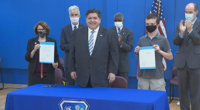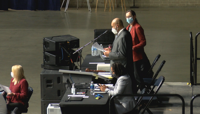(WSIL) -- The Illinois Senate and House have approved Democrats' followup clarifications of their landmark criminal justice overhaul Thursday, appeasing critics by  to a list of crimes that qualify a defendant to remain jailed while awaiting trial.
The Senate voted 38-17 and the House had a final vote of 71-40. The bill now heads to Governor JB Pritzker's desk for a final signature.
Local lawmakers have been outspoken against the bill, which ends cash bail. They have said removing some provisions of our criminal justice system puts the public at risk.Â
State Representative Paul Jacobs (R-Pomona) says he is less than impressed with the recent attempt to fix the original bill.Â
“This is the Democrats� 4th try to get this right, and they’ve really failed yet again,� Jacobs says. “We have seen in other states that ending cash bail puts dangerous criminals right back out on the streets to offend again. This latest ‘fixer-upper� bill to the SAFE-T Act falls short of what is needed, which is a full repeal of things like ending cash bail, allowing unlimited anonymous complaints against our police officers, and stopping a slew of unfunded mandates from wreaking havoc on the budgets of our smaller counties. I voted NO.�
Representative Dave Severin (R-Benton) agrees with Jacobs and voted against the bill.Â
"Well, we've seen this movie before, and this is just another sequel I guess," Severin said. "As sequels usually go, this bill is no better than the original. Democrats are still ending cash bail. Democrats left language in this newest bill that allows for unlimited complaints against police officers, and they did nothing to address unfunded mandates that will hurt our smaller counties in Southern Illinois. I gave their latest fix-it sequel two-thumbs-down."
Another southern Illinois lawmaker, Rep. Patrick Windhorst (R-Metropolis), voted no as well. He said there were many problems in the amendment.Â
"I have been a leading voice in opposing the end of cash bail, as I believe it will lead to an increase in crime in our state. I have also been a staunch opponent of the SAFE-T Act's provision that potentially forces victims of violent crime to appear at pre-trial detention hearings within 48 hours of the crime that was committed against them, putting them back in the same room with their perpetrator. I believe allowing anonymous complaints against police officers and using those anonymous complaints as a way to fire police officers denies our law enforcement officials due process. The SAFE-T Act still contains unworkable and unsafe flaws despite all of the follow up bills that have come through the House and Senate since 2021. I have sponsored legislation that would repeal the original SAFE-T Act, and believe that because of the many problematic parts of the law that will remain in place, repeal is the best way to ensure the safety of our communities going forward."
Over in the Senate, Sen. Terri Bryant (R-Murphysboro) spoke out on the floor Thursday. She said the bill does far too little to protect Illinoisans.Â
“The judges of our state still don’t have the necessary broad discretion to ensure that we keep the public safe. There are still categories of offenses that can’t be held, including burglary. It does not address the unfunded mandates that will cost our counties millions of dollars and force those officials to choose between cutting funding for other priorities or raising taxes.
“At the end of the day, the good components of this bill don’t come close to making up for all of the issues contained in the original law. We could have and should have done more to ensure that the people of Illinois will be safe and have the best possible criminal justice system.�
State Senator Dave Fowler (R-Harrisburg) called the trailer bill and original act "dangerous."
“For two years, State’s Attorneys around this state have been warning of the dangerous effects the new no cash bail system found in the SAFE-T Act will have on our communities. While I am pleased to see some changes that address those concerns, this latest bill doesn’t go far enough to give prosecutors and judges the broad discretion they need to hold dangerous offenders in jail while awaiting their trial.
“We should be working to hold violent criminals more accountable while protecting the victims and innocent people across our state.�














